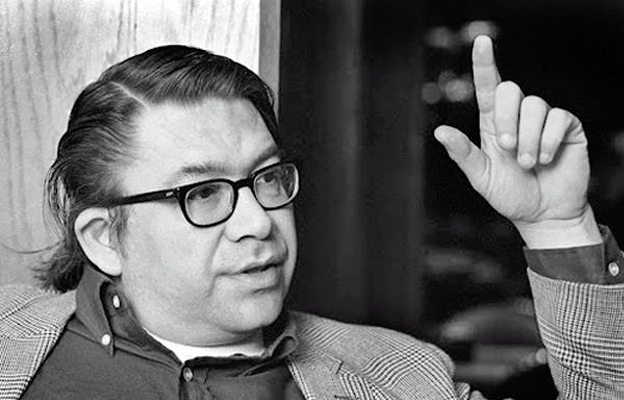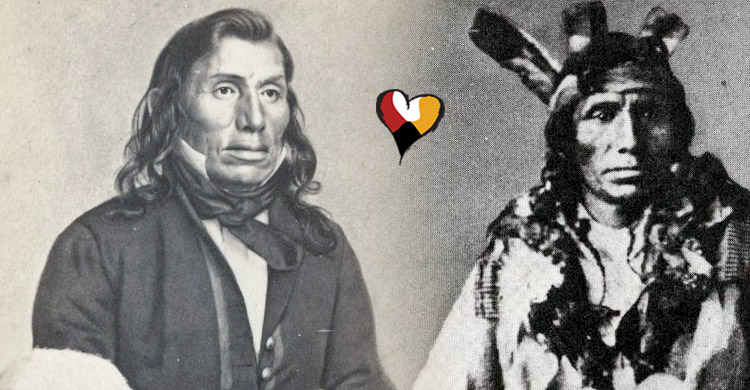Vine Deloria Jr. was a Lakota and Dakota author, theologian, historian, and activist.
Vine Deloria Jr. (Mar. 26, 1933 – Nov. 13, 2005) burst into the American consciousness in 1969 with his book “Custer Died for Your Sins” and later amplified his message through 20 more books about the American Indian experience which helped generate national attention about American Indian issues.
Vine Deloria Jr., a scholar who was trained as both a seminarian and a lawyer, steadfastly worked to demythologize how white Americans thought of American Indians.
“The understanding of the racial question does not ultimately involve understanding by either blacks or Indians. It involves the white man himself. He must examine his past. He must face the problems he has created within himself and within others. The white man must no longer project his fears and insecurities onto other groups, race, and countries. Before the white man can relate to others he must forego the pleasure of defining them.”
~Vine Deloria Jr (1933 – 2005)
“Custer Died for Your Sins: An Indian Manifesto”
The myths, he often said – whether as romantic symbols of life in harmony with nature or as political bludgeons in fostering guilt – were both shallow. The truth, he said, was a mix, and only in understanding that mix, he argued, could either side ever fully heal.
And while his Custer book, with its incendiary title, was categorized at the time as an angry young man’s anthem, Mr. Deloria’s real weapon, critics and admirers said, was his scathing, sardonic humor, which he was able to use on both sides of the Indian-white divide.
He once called the Battle of the Little Bighorn, where Lt. Col. George Armstrong Custer and the Seventh Cavalry were defeated by a combined force of Sioux and Northern Cheyenne in 1876 in the Montana territory, “a sensitivity-training session.”
“We have brought the white man a long way in 500 years,” he wrote in an Op-Ed article in The New York Times in 1976. “From a childish search for mythical cities of gold and fountains of youth to the simple recognition that lands are essential for human existence.”
In “We Talk, You Listen: New Tribes, New Turf” (1970), Mr. Deloria argued that technology and corporate values were destroying American life, and urged a return to the tribal standards of Indian culture as a window to salvation.
In “God is Red” (1973), he took that position of deliverance-through-Indian-ways further, arguing that American Indian spiritual traditions, far from being dated, were in fact more in tune with the needs of the modern world than Christianity, which Mr. Deloria said fostered imperialism and disregard for the planet’s ecology.
But Mr. Deloria often said he was writing for Indian audiences most of all, hoping, he said, to instill belief in a culture had been shattered by history, and by deliberate government policy.
“If you mark down the great figures of the American West in recent times, he belongs there because of his role in reshaping Indian country,” said Charles F. Wilkinson, a professor of law at the University of Colorado and a longtime friend. “I think in the last 100 years, he’s been the most important person in Indian affairs, period.”
“When asked by an anthropologist what the Indians called America before the white man came, an Indian said simply, “Ours.”
~Vine Deloria, Jr.
Vine Deloria Jr. was born in the depths of the Great Depression, on March 26, 1933, in one of the poorest parts of the nation, then or now, in the town of Martin, S.D., near the Pine Ridge Indian Reservation, the son of an Indian Episcopalian clergyman.
The family name, according to the Encyclopedia of North American Indians, was derived from the name of a French fur trapper called Des Lauriers, who was taken into the tribe around 1800. He was educated initially in reservation schools, and after a stint in the Marines in the 1950s, he received a degree in general science from Iowa State University.
But religion and spirituality at the border of Indian and white ways was a running theme in the Deloria family – an ancestor, the encyclopedia entry says, was one of the earliest Sioux converts to Christianity, in the 1860’s – and Mr. Deloria eventually followed his father’s path and received a master’s degree in theology in 1963 from the Lutheran School of Theology in Illinois.
From there, from 1964 to 1967, he worked for the National Conference of American Indians, where even before the book that made him famous, he became a leading spokesman for Indians in Washington as the group’s leader. He often testified before Congress at a time when the ferment of ideas and social movements in civil rights and ethnic identity were in full boil.
“Religion is for people who’re afraid of going to hell. Spirituality is for those who’ve already been there.”
~Vine Deloria Jr.
Vine Deloria Jr. took a law degree at the University of Colorado in 1970, and later, in 1990, joined its faculty, teaching history until his retirement in 2000. His first book, “Custer Died For Your Sins,” made him a national symbol.
The book was not a history, but rather a personal, passionate statement. The New York Times reviewer John Leonard said it was Mr. Vine Deloria’s emergence as a real person through the book’s pages that was the ultimate power of its argument.
Vine Deloria Jr. died on November 13, 2005, in Golden, Colorado from an aortic aneurysm.
SOURCE: Based on materials from The New York Times and “Custer Died for Your Sins: An Indian Manifesto” by Vine Deloria, Jr.






